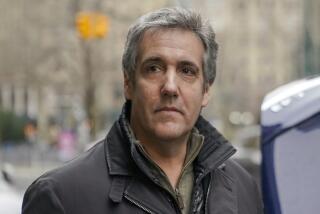Convicted terrorist can’t sue ex-Justice lawyer, court rules
- Share via
A UC Berkeley law professor who helped the Bush administration create policies to justify harsh interrogation techniques and prolonged detention may not be sued by an American citizen detained under those conditions, a federal appeals court ruled Wednesday.
The U.S. 9th Circuit Court of Appeals said Jose Padilla, an American citizen arrested in 2002 and declared an “enemy combatant,” may not hold professor John Yoo liable for “gross physical and psychological abuse” that Padilla said he suffered during more than three years of military detention.
A three-judge panel of the court said laws governing combatants and the definition of torture were unclear during the years policies were crafted.
Padilla alleged he was subjected to death threats, given psychotropic drugs, shackled and manacled for hours at a time, denied contact with family or a lawyer for 21 months and refused medical care for potentially life-threatening conditions.
“That such treatment was torture was not clearly established in 2001-03,” Judge Raymond C. Fisher, a Clinton appointee, wrote for the court.
Federal officials said they detained Padilla after discovering he was participating in a plot to attack the United States with a radioactive “dirty bomb.” After being held in isolation in a military brig for more than three years, Padilla was transferred to civilian custody and later convicted of conspiracy to commit terrorism, based on evidence unrelated to the allegations used to detain him militarily.
As a deputy assistant attorney general in Bush’s Department of Justice, Yoo advised the government that the military could legally use a wide range of techniques to detain and interrogate terrorist suspects.
“I am glad that the 9th Circuit agrees that Padilla and other convicted terrorists shouldn’t be allowed to use our own legal system to continue fighting against the United States,” Yoo said.
But Ben Wizner, who represents Padilla in another federal lawsuit against other Bush administration officials, called the ruling “quite wrong” and “disappointing.”
He said the court missed an opportunity to declare “once and for all” that the methods used against Padilla were “clearly unconstitutional.”
“Even if they were to give John Yoo a free pass, they missed an opportunity to make sure that nothing like this would ever happen again,” Wizner said.
The 9th Circuit’s ruling said the U.S. Supreme Court did not declare until 2004 that citizens held as enemy combatants have constitutional rights.
Even now, the 9th Circuit said, “it remains murky whether an enemy combatant detainee may be subjected to conditions of confinement and methods of interrogation that would be unconstitutional if applied in the ordinary prison and criminal settings.”
Padilla’s 2007 conviction hinged largely on an application form that prosecutors said he had filled out for an Al Qaeda training camp in Afghanistan in 2000.
More to Read
Sign up for Essential California
The most important California stories and recommendations in your inbox every morning.
You may occasionally receive promotional content from the Los Angeles Times.










